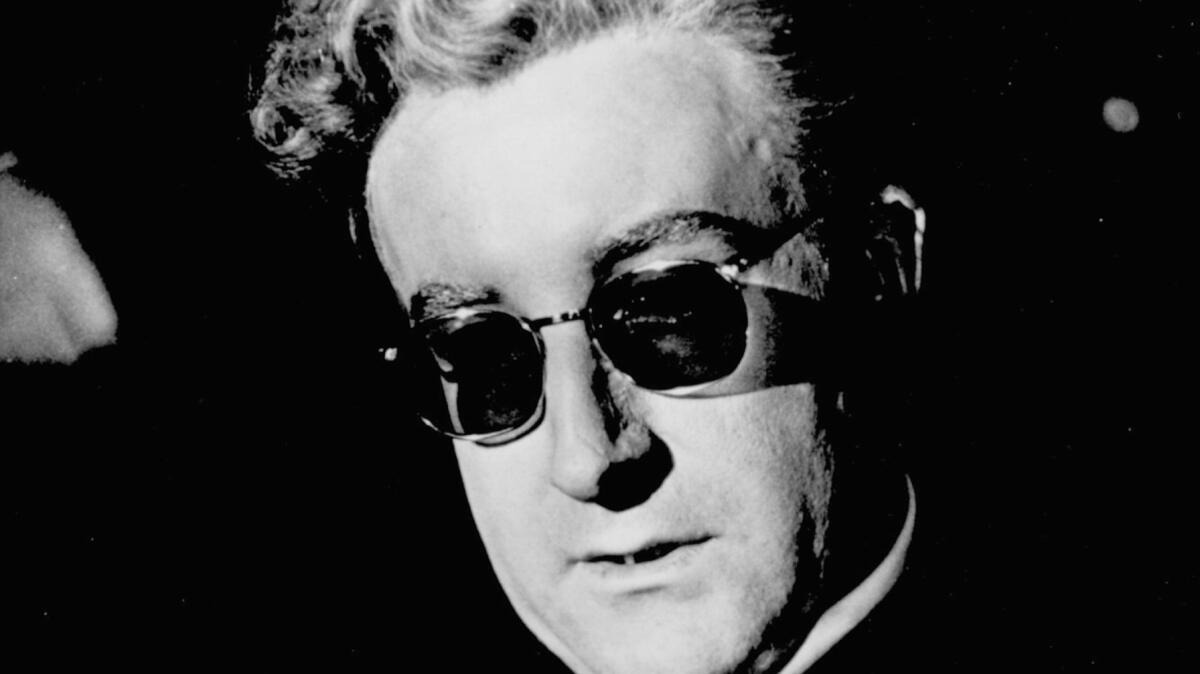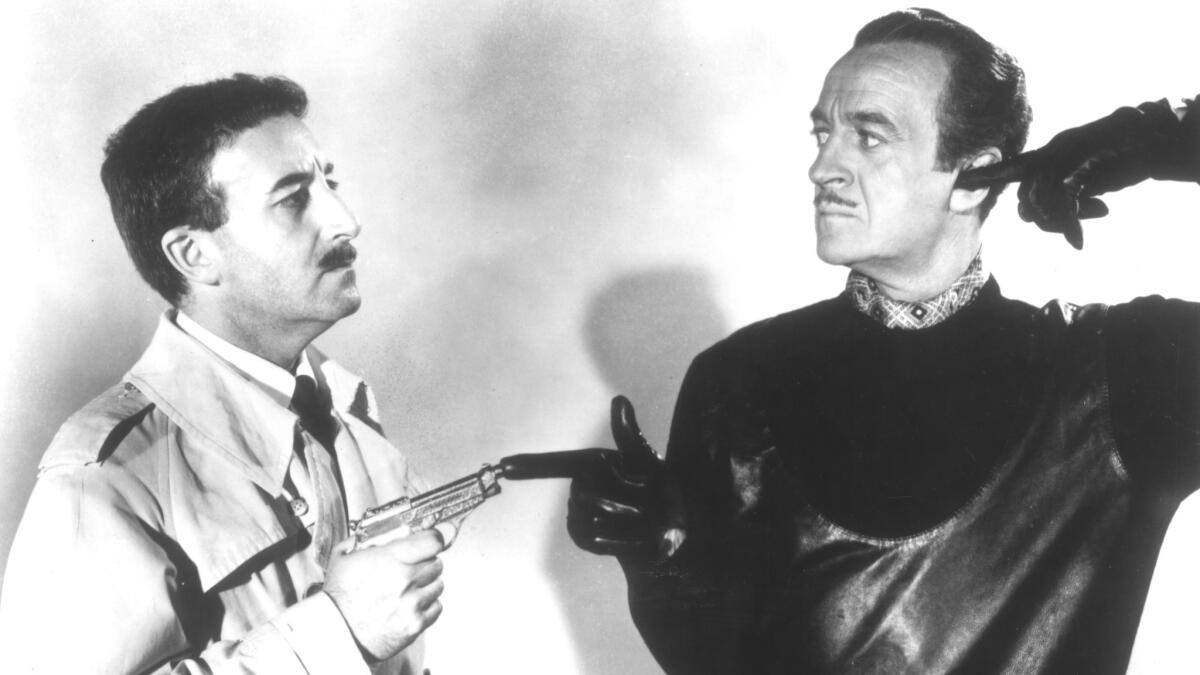From the Archives: Actor Peter Sellers, Comic Film Genius, Dies at 54
- Share via
Peter Sellers, the comic genius whose film portraits ranged from the grotesque Dr. Strangelove to the bumbling Inspector Clouseau and on to the middle-aged TV baby, Chance, died early today in London’s Middlesex Hospital following a massive heart attack. He was 54.
Sellers, long plagued by heart trouble, was in his suite at the Dorchester Hotel on Tuesday when he complained of chest pains. He was rushed by ambulance to the hospital, where he underwent intensive resuscitation procedures after his heart stopped.
He sank into a deep coma during the day Wednesday with his fourth wife, British actress Lynne Frederick, 25, at his bedside.
A hospital spokesman said: “Mr. Sellers’ death was entirely due to natural causes. His heart just faded away. His condition deteriorated very suddenly.”
Sellers suffered the first of a series of heart attacks in 1964 and had a pacemaker implant in 1977.
Sellers’ death came at the height of his career. His latest film “Being There,” earned him wide critical acclaim as an actor whose technique and intelligence carried him beyond his previously acknowledged comedic gifts.
In “Being There,” Sellers played Chance, a middle-aged gardener, who, when the master of his walled-in house dies, is left wandering through the streets of Washington.
He is blank-faced and simple-minded. Only the glare of a television set holds his attention. But, somehow, his passivity is mistaken for strength, his intellectual emptiness for wisdom, and Chance becomes Chauncey Gardiner, talk-show eminence and presidential adviser.
Critics called it a masterful performance, economic and thoughtful, and a change from the more flamboyant, occasionally slapstick Sellers of earlier years. The portrayal resulted in an Academy Award nomination for best actor.
Sellers first came to the attention of U.S. film audiences in the late 1950s in a series of sharply drawn roles in small British comedies—“The Ladykillers,” “I’m All Right Jack” and “The Mouse That Roared.”
Then Sellers played Claire Quilty, the perverted playwright who tries to steal Humbert Humbert’s nymphet in “Lolita,” and followed that with his multi-character tour de force in Stanley Kubrick’s “Dr. Strangelove.”
‘Nobody Else . . .’
Strangelove was Sellers at his most flamboyant—a brilliant mime and master of accents—the German-accented scientist whose arm kept involuntarily snapping into a Nazi salute. To top it off, Sellers also played the weak-willed President and a rather sappy Royal Air Force officer.

It wasn’t that Kubrick was trying to stretch a thin budget. “It is just that there is nobody else in the world who can play each of those parts like Sellers,” the director said after filming was completed in 1963. “He was the best possible for each one of them, and I wanted the best.”
Sellers created his most popular character later in the 1960s with Inspector Clouseau of the “Pink Panther” movies.
Charmingly inept and obtuse, Sellers’ Clouseau was a classic cinema figure—a French detective who fancied himself a great lover and crime-solver, practiced karate on his Filipino houseboy and blundered his way through ambushes and pratfalls.
A good deal of it was slapstick and though Sellers was fond of Clouseau and the series made him rich—he was working on the script for yet another Pink Panther film at the time of his death—Sellers looked on Chance as his favorite character and “Being There” as his best movie.
Perhaps Sellers was being a bit pessimistic when he told Time magazine in a cover story four months ago that, “My ambition in the cinema, since I came across it, was to play Chance . . . I have realized that ambition, and so I have no more.”
But, by must accounts, Sellers was at the time of his death not a terribly happy man. He had a reputation as a fiendishly hard worker who was touchy and difficult for other actors, writers and directors to deal with.
Personally, life was far from smooth. Sellers’ first marriage—to an Australian actress named Anne Howe—ended in divorce after 10 years and two children.
Sellers blamed the breakup on an affair he claimed he had with actress Sophia Loren in 1961, but Loren said they were just good friends. This seemed to annoy Sellers.
Swedish Starlet
A second marriage to Swedish starlet Britt Ekland ended after five years. And Sellers was angry with Ekland’s recently published autobiography that pictures him as a cold, distrustful husband.
“A professional girlfriend and an amateur actress,” said Sellers of Ekland.
There was a relatively brief third marriage to London socialite Miranda Quarry and then marriage to his fourth wife, actress Frederick.
Sellers in his later years seemed entranced by mysticism and spiritualism, claiming he was on the verge of being able to communicate with his mother from beyond the grave.
She was an actress who dreamed of fame and when it eluded her concentrated on her ambition for her only child. She died in 1967.
“I hear from her frequently,” Sellers said in an interview with The Times earlier this year. “I am not at the stage yet where I can hear her aurally. I feel her through my head, sort of like vibrations. I have reason to believe I may reach a stage where I can actually hear her. Probably in two years.”
Sellers was deeply influenced by his first, massive heart attack in 1964:
“It is impossible to say how much it has influenced my work, but it is considerable. As for the rest, life is so very short.

“David Niven was telling me about a dinner he had with Noel Coward once at which Coward was lamenting his contemporaries dying off. He said to Niven (and at this point, Sellers slipped into a perfect imitation of Coward), ‘I’m grateful if they get through lunch with me.’ I know what he meant.”
Mystical and moody, feeling deceived by an ex-lover and an ex-wife, Sellers had about him the saving grace of humor.
During the Time interview, he suddenly turned to his wife, dropped into a lower-class British accent and punctured his self-pity:
“Ere ‘e is, Mabel, wit’ all ‘is money and ‘is big fancy cars an ‘is wimmen cryin’ about ‘ow depressed ‘e is. Gawd in ‘eaven, am I supposed to feel sorry for ‘im?”
Parents in Vaudeville
Sellers was born in Southsea, England, on Sept. 8, 1925, the son of William Sellers and Agnes Marks Sellers. They were vaudeville performers and Sellers could trace his lineage on his mother’s side back to Benjamin Disraeli, the Victorian Era prime minister.
His childhood, when not in school, was spent in a succession of theatrical boarding houses and the backstages of music halls. The youthful Peter Sellers wanted to be a drummer, but jobs were few.
In World War II he was in a RAF musical troupe, entertaining airmen in India and the Middle East. After the war, he worked his way up through vaudeville, variety shows at London’s Paladium, radio and into the movies.
By the mid-1960s he was ranked with Britain’s other great comic actor, Sir Alec Guinness, and there were offers to branch out in other directions.
Those who knew him well said he was a perfectionist, driven but full of self-doubt. Some said he hid behind the makeup and accents of his roles, almost the stereotypical actor—shy and unsure, his ego riding on the continued faith of his fans, coworkers and lovers.
But most never lost sight of one essential truth when discussing Seller, said one friend some years ago:
“Peter is a deep cellar. The proportions are simple, but everything inside is incredibly complex. There are heaps of all kinds of junk strewn about in there, lots of it childish, but there is also a lot of the pure gold bullion of a real artist.”
From the Archives: Shelley Winters, 85; Oscar Winner Went From Bombshell to Respected Actress
From the Archives: Ethel Waters, Singer and Actress for 60 Years, Dies
Start your day right
Sign up for Essential California for the L.A. Times biggest news, features and recommendations in your inbox six days a week.
You may occasionally receive promotional content from the Los Angeles Times.



